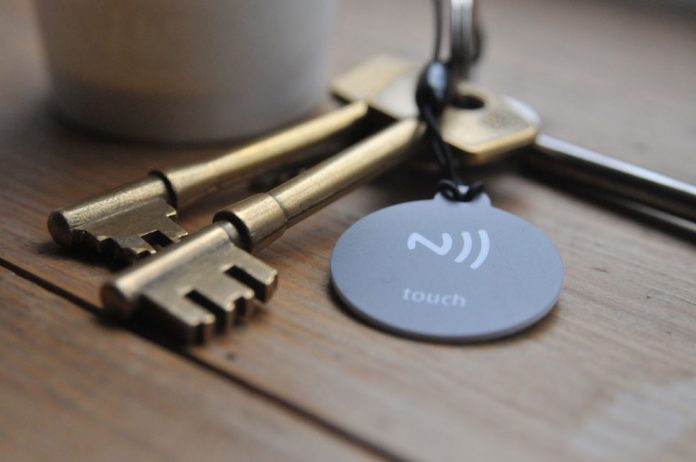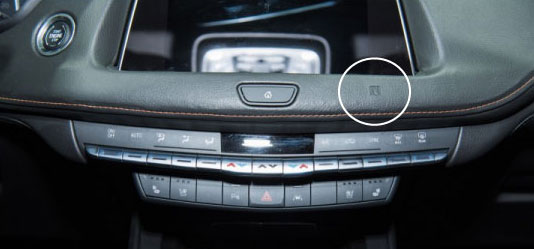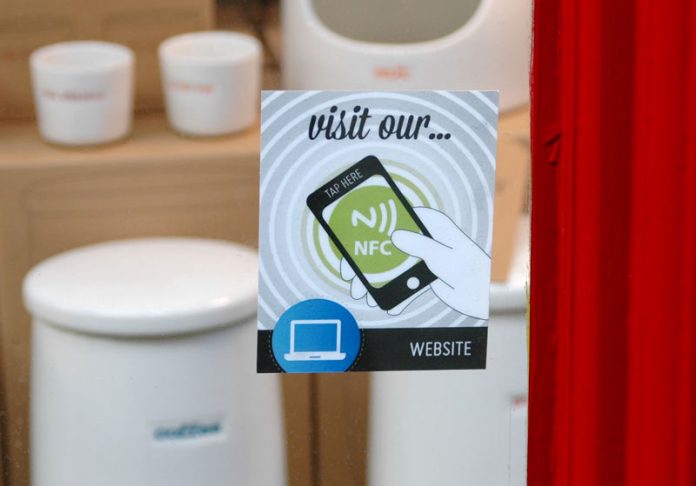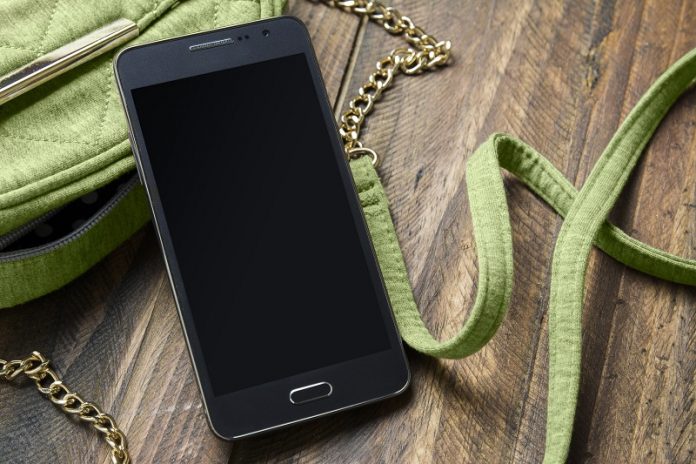- News
- Top 10 Uses For NFC Tags
Top 10 Uses For NFC Tags

With the news that the latest generation of Apple iPhones will be able to scan NFC tags out of the box without an additional NFC app, 2019 looks like it might be a groundbreaking year for NFC. Here at Seritag, we come across hundreds of great NFC projects and the scope and quantity of applications is constantly growing.
Therefore, and because everyone likes a good top ten, Seritag have put together our thoughts on 2019's top ten uses for NFC tags. The top ten isn't in order and it certainly doesn't define the limits of using NFC tags. However, we've tried to consider the most significant market areas where NFC tags will make their mark over the next year.
1. Object Identification

With object identification, NFC tags are used on items that may not immediately or easily be identified from other similar objects.
An example might be estate agents using NFC tags to identify keys or an IT data centre technician using NFC tags to identify cable routing. Many of these functions will have been previously undertaken with written tags. The difference is that the NFC tags can connect to the cloud to allow connected data such as when the keys were last used and who took them. Or, in the example of cable routing, the last time it was checked.
There's three simple reasons why NFC works better than other solutions. Firstly, the near field contactless technology allows a more precise object identification than RFID without the visual alignment requirements that come with QR Codes. Secondly, because scanning is realtime and data on the object accessed via the internet is immediate and extensive, the ability to track and trace is faster and simpler. Thirdly, the accuracy of using a microchip label is significantly higher than using written codes.
The quantity of projects, applications and tags being used within object identification is increasing quickly and we think 2019 will become a breakthrough year.
2. Bluetooth Pairing With NFC

We accept that in many cases with Bluetooth pairing the 'tag' is more likely to be an electronic circuit board than a typical NFC sticker, but we'll include on the list because it acts like an NFC tag and you could use a simple NFC for Bluetooth pairing.
So how does Bluetooth Pairing work ?
An NFC tag (or circuit board pretending to be a tag) is contained inside the electronic product. At the moment, that's likely to be a pair of headphones, a wireless printer or a camera. A user can scan the tag with their phone and the NFC tag passes the Bluetooth address instantly, initiating the connection. Technically, this is called a handover process because the NFC is simply acting as a simple way of allowing a Bluetooth connection between the phone and the target device.
Why Bluetooth Pairing makes the top 10
Of course, this isn't new at all. NFC pairing has been available for many years on many devices. However, in the past, the only phones that could actually use the tech were Android, Windows and Blackberries. In the last year, Apple has gradually enabled NFC tag reading on the iPhone which in turn has allowed Bluetooth pairing. Which means that, while it only works on the latest phones, there's nothing to stop manufacturers putting NFC tags into their products to allow quick and easy Bluetooth pairing. In fact, you can now even find a little NFC logo in your Cadillac.

Aren't Bluetooth and NFC competitive technologies ?
No. NFC is an object level connection technology and Bluetooth is an area level connection technology. NFC is designed as a temporary data transfer method where Bluetooth is designed as a permanent data transfer method. Their use cases are quite different and it's exactly the reason why they work so well together for Bluetooth Pairing. You know exactly which object you are trying to connect to because you'll be right next to it to scan the NFC Tag.
3. Product Information

We could write a book on the number of different ways NFC tags can be used for product identification but needless to say, it's right up there in the top ten.
To be clear on the definition, Seritag divide the use of NFC tags within products into three sections - product identification, production information and product authentication. While it's quite possible for an NFC tag to do all three at the same time, each serves a unique function. Product identification is about identifying a specific, perhaps unique, object which might look very similar or identical to something else. Product information is about allowing access to information about a product which might be shared across others.
NFC product information examples
NFC tags embedded into the label of a garment can provide washing or other care instructions. Additionally, it can give information on the source of the fabrics, where the garment was made and perhaps even who made it. It could also contain information allowing the user to re-order the same garment or find similar or accompanying garments.
An NFC tag on a microwave could provide the latest user information or recipe ideas. It could allow the download of a user manual or videos to show how to use advanced features.
Why NFC tags work for product information
It's about user experience, ease of tag integration and importantly the transfer of useful information. A garment label can only contain so much information. By making that garment label 'smart', there's an ability to provide not just more information but constantly changing and up to date information.
4. Round Management

To make it clear, this isn't about making sure you get your drinks at the bar - although there has been a NFC drinks ordering promotional campaign for this using NFC tags.
Round management is a term generally used to describe a person that, as part of their job, is required to visit specific locations. Obvious examples might be a healthcare worker who will travel from home to home checking on patients or a security guard who will do a round every few hours checking doors and windows.
Proof of compliance
However, round management is starting to spread to related but interesting areas. Seritag recently saw a project where tags were being placed on industrial machinery and the user was required to check all the points before the machine could be used. This variation of round management is a rapidly growing area in many instances because it ties in with proof of compliance, perhaps with fire regulations or health and safety.
The concept is simple and effective. In the past, a worker might have had a clipboard and a list of items to check, for example, fire extinguishers. The difficulty is that there was no proof that the user had physically moved from their desk and seen each fire extinguisher in place. With NFC tags attached to each fire extinguisher, the user would be required to walk around with their mobile and actually scan each tag in place. This serves two purposes. First, the reporting function has moved from paper to digital meaning it's both realtime and more efficient. Secondly, there's a stronger proof of compliance.
However, where we are today is only the first step. Current NFC tags can be cloned and in some circumstances that might be a risk. However, the increase in authentication NFC tags will change all that meaning that a tag can be unique and not able to be copied. Combine that with the new tamper proof tags and you have a very powerful proof of compliance system - a long way removed from a pencil and clipboard.
5. Asset Tagging

This is a relatively obvious use case for NFC tags but, to date, has been a surprisingly small element of the market. So, let's explore the benefits.
Traceability
Using NFC tags allows the user, via a mobile phone, to instantly check and log assets. For businesses with a large number of assets to track, the ability for any user with a mobile phone to scan their current items provides and instant and quick way of gathering asset information.
Accuracy
One of the significant benefits of NFC tags over more traditional methods of simple ID stickers is the accuracy provided. An NFC tag scanned by a mobile phone cannot be accidentally recorded incorrectly. In addition, the near field nature of NFC tags mean that there is unlikely to be any accidental and non-intentional scanning of objects.
Security
One of the biggest issues is of course that NFC tags can be removed and/or placed on other items. Tamper proof NFC tags have been around for a while but now there's a new generation of tamper detection NFC tags which will detect removal or tampering. There's also the new authentication level tags which are almost impossible to clone.
Advanced monitoring
In addition to the new generations of authentication and tamper detection tags, there are also an increasing range of environmental monitoring NFC tags. These smart tags can monitor aspects such as temperature on an ongoing basis and report this with each scan. For items such as food or medicine it allows an easy way for anyone with a mobile to check the goods along the supply chain.
NFC tags nemesis - metal
One of the downsides with using NFC tags for asset tagging is NFC tag's dislike of metal surfaces. This means one of two things. Either the regular tags can't be placed directly on metal or special 'on-metal' NFC tags for metal surfaces need to be used. Or in some cases, even a combination of the two. This can sometimes be logistically difficult as the person attaching the tags may not be aware of this restriction. Unfortunately, this is probably the biggest disadvantage with NFC for asset tagging and one that is inherent with the technology.
Why it makes the top 10
In a word, tracability. In a similar way to proof of compliance on round management, the ability to be sure that assets are where they should be and are there at all is a complex task. And it's made a lot easier when the checking is all real time and doesn't require expensive scanner devices. It's still a small area of the NFC tag market, but Seritag don't expect it to stay that way for long.
6. Marketing

Where can you start ? The number of projects that have already been undertaken is a drop in the ocean compared to what's ahead. Particularly as the new iPhones with their background NFC tag scanning gradually enter the market.
Clearly, using NFC tags in marketing is powerful and benefits are obvious - direct user connection. However, careful consideration needs to be made as to the use and method to get the best results. Most of the best NFC campaigns work well for two reasons. Firstly, dwell time. In essence, is someone going to be there long enough to get the phone out and start scanning tags. Second, proximity. Will the person be close enough and private enough to want to or be able to scan the tags.
We'll have a look at a few options here and try and consider where things are going.
Smart posters
Smart posters have been a bit of a catch-word in the NFC industry but here at Seritag we aren't afraid to make a call. And we think they are a waste of time. That's because the vast majority of people don't want to look silly by standing in front of an advert waving their mobile phone. We'll say it again, to get an NFC marketing campaign to work, you've got to be close to the consumer.
Beer/drinks mats / Table tags
As the complete opposite to smart posters, you have the two things that make an NFC campaign work. You have dwell time because users are standing/sitting drinking and you have proximity to the user at a time when they might have their phone in their hand.
Shelf labels
Shelf labels are a great idea for store promotion. In store NFC advertising can be broken into three sections - store level, aisle level and product level. At the store level, you have smart posters and you will have read what we think about them - bin them. Then you have aisle level or shelf labels. These are great. The consumer is close, it's a relatively private situation so the user isn't go to be embarrassed using the phone to scan the tag and it's a lot cheaper putting one tag on a shelf than thousands on the products. From a store angle, it can be used to tell the user more information - perhaps a menu suggestion in a food store. From a brand angle, it's a chance to persuade the user why they should choose your brand over another. Brilliant.
Product integration
Let's be clear. Seritag consider this to be the biggest growth area for NFC tags bar none. Everything from electronic goods, to garments and accessories, to food and drink and even cars can have integrated NFC tags allowing interaction. Where we won't see much traction in product integration is FMCG (fast moving consumer goods). That's stuff like cans of beans and bottles of cleaning powder. Tags are still too expensive to supply and to attach to make it worth it. But on higher end food and drink such as wine or spirits, it's already happening.
And there's two angles. First is promotion which crosses with Product Information. The second, which will start to come in during 2019 but is one for next year's top ten, is authentication. We will start to see tags in fashion items and luxury goods along the lines of Nike's sports shirts and shoes, but with a focus on information rather than authentication. Authentication will be here and there in 2019, but it's a longer term development.
7. Product Located Consumable Re-ordering Tags : PLCR or 'Splicker' Tags
PLCR or Splicker (a play on the acronym PLCR and sticker) tags are labels applied to, or integrated in, products that enable quick re-ordering of supplies. For example, an NFC tag might be attached to a washing machine to allow one scan re-ordering of washing powder. Or a tag might be attached to an printer so that inkjet cartridges can be quickly re-ordered with a simple scan.
Other Options
Splickers aren't new. Amazon have their own DASH format which is connected to Amazon's Dash Replenishment Service. The tags are connected to a users phone via Bluetooth to allow the push-button based device to work. At the time of writing, the tags cost £4.99 but came with the same amount of credit on the first order.
Why NFC Tags ?
Clearly, this concept could use other technologies including QR codes or Bluetooth like Amazon's DASH.
However, adding an NFC tag into a product with a small icon outside is more attractive than sticking an ugly QR code onto the front. Even if the label is attached to the outside, it's a more attractive branding and identity proposition than a QR Code and in many cases the tags can be smaller. More importantly, as regular readers of Seritag will know, when it comes to consumer experience, NFC beats QR codes hands down. It's magic and now that the new iPhones have joined Android with background tag scanning, all that's needed is a simple wave of the phone.
Why Splickers make the top 10
Seritag think that the use of PLCR tags or 'splicker' tags has been held back by the lack of iPhone support. There's also the issue that not many people order consumables only by themselves. However, we think that might change. How many times has your printer been low on ink and it's taken more time that you want to find out which cartridge to buy and then set about buying it. A simple 'scan' to get the product you need is going to make things easier.
Seritag think that 2020 could well be the year that Splickers start to make their impact and you start seeing them (or start being able to buy them) for your products.
What does PLCR stand for ?
Product Located Consumable Re-ordering. An NFC Tag or indeed any other device that is directly attached to a product for the purpose of re-ordering consumable items.
8. Supply Chain Management

RFID tags have long been used in the supply chain. RFID tags have a longer scan distance and many can be read together in large quantities. This makes the technology superb if you have a large warehouse and need to scan box contents quickly and easily.
NFC is near field. That means that you need to be within at most an arms length and usually touching distance of the tag. In many ways, that makes NFC unsuitable for supply chain but it's also it's great benefit.
Supply chain authentication
In many cases, the growth of NFC in supply chain management will be closely linked to the adoption of the latest generation of authentication tags. This is because in most cases it's about using NFC to check individual products along the supply chain to ensure supply chain integrity. NFC tags inserted into individual items at the factory can be checked all along the supply chain to the final destination to ensure authenticity.
No specialist hardware
The reason that NFC tags are so powerful in this use case is that no specialist hardware is required to scan the tags. Anyone with a mobile phone can now scan NFC tags at any point and pull any associated data. In combination with the new authenticity tags, this provides a very cost-effective and flexible way of ensuring supply chain integrity. Even without using the new authentication NFC tags, it can achieve a level of identification that cannot be matched by QR codes or other similar widely available technologies.
9. Product Authentication

We are huge fans of using NFC for authentication to point where we are prepared to say that it's the number one reason to choose NFC tags over any other similar tech. It's, as they say, the killer app.
A reader in everyone's hand
One of the reasons is that because almost all mobile phones can now be used to scan NFC tags, they can also be used to check an items authenticity. No special hardware.
A massive and growing counterfeit market
The counterfeit market is, by most measures, becoming a trillion dollar industry and it's everywhere. Pharmaceuticals, clothing, consumer tech and even aircraft parts. It's not so much that it's eating into brands profits which is how we often think of it. It's that it's also now presenting a danger to life. NFC tags aren't going to solve this problem - they aren't some silver bullet. But they can protect genuine brands and genuine products and provide the consumer and businesses with a level of confidence that what they have in their hand is what they expect it to be.
Long term growth
However, we also think that while authentication deserves a mention on the top ten, it's a long term growth item. It will be held back in 2019 for two reasons - cost of the tags and supply.
10. Access Control
RFID has long been used for access control and in fact, in terms of ticketing, NFC has been used for many years as well. A very large number of transports systems rely on NFC technology to function.
NFC tags not tickets
For number 10 though, we are talking about using NFC tags in a wider application and specifically where the reader will be a mobile phone. For example, there's a growing number of small scale applications which use NFC tags and mobile phones for things like parking control. Tags are replacing simple paper labels for parking permits because they can be easily scanned and as with many other applications, just by using an everyday mobile.

A quick intro to NFC tags - what they are, how they are used and the different types of tags

Details of our NFC tag encoding services.

How to order ID / QR code printing on your NFC tags.

How you can order a UID scan of your NFC tags.







